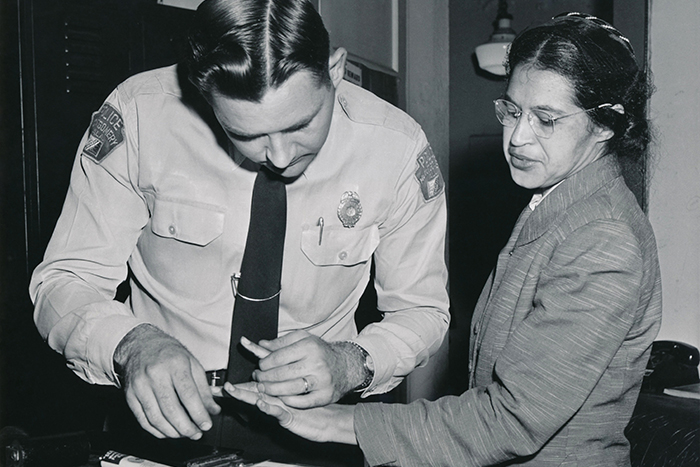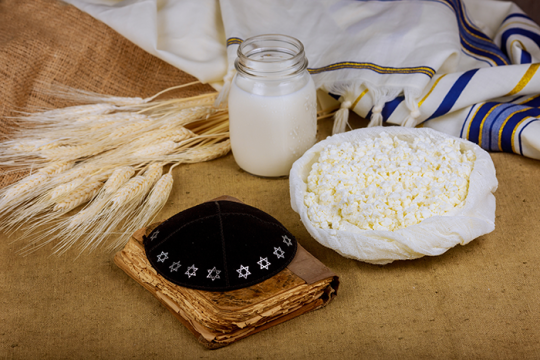
Parks being fingerprinted by Lieutenant D.H. Lackey on February 22, 1956, when she was arrested again, along with 73 other people, after a grand jury indicted 113 African Americans for organizing the Montgomery bus boycott.
Today, the anniversary of Rosa Parks’s birthday, is the ideal time to revisit her life and legacy for the inspiration and wisdom they provide. Many Americans remember Rosa Parks as the tired seamstress who refused to move to the back of a bus, but Rosa Parks is much more than that story: though she did not identify as Jewish, her life reflected a commitment that we might identify as – repairing what is broken in our world. Here are three key insights from Rosa Parks’ life we can bear in mind as Black History Month begins:
1. She was an activist.
As Margaret Mead eloquently stated, “Never doubt that a small group of thoughtful, committed, citizens can change the world. Indeed, it is the only thing that ever has.”
Rosa Parks grew up talking with her grandfather each night about Black resistance as he guarded their home with a shotgun from the Ku Klux Klan. They spoke of key historical figures like Crispus Attucks, Harriet Tubman, and Marcus Garvey, inspiring Parks’s later commitment to civil rights activism. As an adult, she was a member of the Montgomery NAACP chapter and later its secretary. The iconic photo of Parks being fingerprinted was the second time she was arrested for not giving up her seat. Parks also knew the driver of the bus, James Blake, who had thrown her off his bus in the past. She usually checked who the driver was before getting on a bus because, as she wrote in her autobiography, “I didn’t want any more run-ins with that mean one.” The day she refused to give up her seat, she hadn’t checked who the driver was: “If I had been paying attention, I wouldn’t even have gotten on that bus.”
Parks’s work as NAACP secretary made her a well-known figure in her community: “Everyone knew her based off of her writing down stories like Recy Taylor's: Oh, she was the lady who held my hand when my uncle got beat up. She got my kid involved in a youth program to read books. She was the one who came and tried to get me to register to vote.” As Justice Ruth Bader Ginsburg said, “Fight for the things that you care about, but do it in a way that will lead others to join you.”
2. She understood and lived at the intersection of racism and misogyny.
Rosa Parks grew up in Tuskegee, Alabama, where she attended the Montgomery Industrial School for Girls, a private school founded by liberal-minded Northern women. Her mother, Leona McCauley, advised her children to “take advantage of the opportunities, no matter how few they were.” However, Parks was twice forced to put her education on hold to care for her grandmother and mother. Rosa Parks’s husband, Raymond Parks, supported her desire to complete her high school education, and she earned her diploma in 1934.
Rosa Parks also investigated cases of sexual assault. She worked with the NAACP on the Scottsboro case, in which nine Black boys were falsely accused and convicted of raping two white women. And when six white men raped Recy Taylor in 1944, the NAACP sent Rosa Parks to investigate. She conducted an interview and launched the Alabama Committee for Equal Justice for Mrs. Recy Taylor. When a grand jury refused to indict the six rapists, Rosa Parks spearheaded a letter-writing campaign. Her own letter to the governor read,
As a citizen of Alabama, I urge you to use your high office to reconvene the Henry County Grand Jury at the earliest possible moment. Alabamians are depending upon you to see that all obstacles, which are preventing justice in this case, be removed. I know that you will not fail to let the people of Alabama know that there is equal justice for all of our citizens.
The governor ordered another investigation, but a grand jury again refused to indict the six rapists. (Alabama legislators issued a resolution in 2011, apologizing to Recy Taylor for their failure to prosecute her rape case.)
3. She refused to be silent.
Rosa Parks had a deep and abiding passion for justice, beginning at a very young age. Parks’s niece recalled,
When she was 10, a white boy pushed Auntie Rosa, and she pushed him back. Auntie Rosa's grandmother told her, ‘You need to be quiet, you need to stop being so vocal.' She was told, as black people, we’re not allowed to do those things to whites. Her grandmother was concerned that she’d get hurt, that she could even get lynched. But Auntie Rosa told her grandmother, 'Let them try to lynch me.’ She was that bold, even when she was young.
Rosa Parks’s tenacity was also evident in her persistence in registering to vote. Today, troubling signs of voter suppression remain as states nationwide restrict access to the polls, especially for Communities of Color. The right to vote is fundamental to our democracy; any infringement upon that right is dangerous.
Rosa Parks’s life and legacy leave behind key lessons for a struggling democracy like ours: never stop striving for knowledge and inspiration, work with others to achieve progress, and concentrate your passion and energy into a cause that matters to you.
As Jews and as Americans, we have a responsibility to follow in the footsteps of activists like Rosa Parks. This Black History Month, the United States must also commit to studying and developing reparations proposals for African Americans by passing H.R.40. We are inspired by our Jewish tradition which teaches us that a victim of a crime is made whole through the concept of , the act of repentance informed by knowledge and understanding that must accompany the repayment for damages done. This country can never fully atone for the suffering it has caused, but this Black History Month we can take this essential step and make a true commitment to address the historic and ongoing harms done to the Black community.
We cannot wait any longer.
Related Posts

Finding Hope

Favorite Jewish Teachings from Leaders of Color



